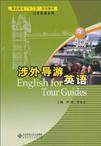涉外导游英语(下)
出版时间:2010-8 出版社:北京师范大学出版社 作者:梁悦,蔡龙文 主编 页数:2242
内容概要
本书以后现代主义教育理论为指导,解构传统的课程学科体系,以涉外导游职业岗位行动领域为逻辑基点,创设学习领域和学习情境;运用建构主义学习理论,设计教学过程、组织教学实施,从而最终达到涉外导游素质的自我养成和涉外导游能力的自主建构之目的。
书籍目录
MODULE 3 QUALIFICATIONSUnit 1 Tours of MountainsUnit 2 Tours of RiversUnit 3 Ancient Defensive ProjectsUnit 4 Tours of ArchitecturesUnit 5 The Art of Classical Chinese GardensUnit 6 Buddhist Temple ComplexUnit 7 Ancient TombsUnit 8 Festival Celebrations in ChinaUnit 9 Wild AnimalsUnit 10 Tours of Theme Park
章节摘录
插图:Answer to Question 1: Yes.Answer to Question 2: Feng Shui: (pinyin), feng shui; is anancient Chinese system of aesthetics believed to utilize the laws of bothHeaven (astronomy) and Earth (geography) to help one improve life byreceiving positive Qi. The term Feng Shui is literally translated as "wind-water" in English. Qi rides the wind and scatters, but is retained whenencountering water. Traditional Feng Shui practice always requires anextremely accurate Chinese compass, or Luo Pan, in order to determinethe directions in finding any auspicious sector in a desired location. FengShui holds a concept of trying to harmonize the flow of life-energy (Qi inChinese) through the house.
编辑推荐
《涉外导游英语(下册)》:高职高专“十二五”规划教材,行业英语系列
图书封面
评论、评分、阅读与下载
用户评论 (总计1条)
- 书本是拿到了,没有上册只有下册,没有怎么看,大体一翻好像有点简单,不过排版各方面都是不错的,
推荐图书
- 国试书业·供应链管理试卷
- 寻求黄金分割点
- 苍天录·王朝 1
- 自然地理科普馆(中国篇)
- 快乐麦田·天天向上(上)
- 活着的理由
- 国试书业·中国现代文学史试卷
- 国试书业·财务报表分析
- 国试书业·财务报表分析
- 国试书业·老年护理学试卷
- 国试书业·管理信息系统试卷
- 保荐代表人胜任能力考试辅导系列
- 投资银行业务能力过关必做2000题
- 国试书业·劳动法学试卷
- 快乐麦田·天天向上(上)
- 保荐代表人胜任能力考试辅导系列
- 证券综合知识辅导教材
- 义务教育课程标准实验教科书配套用书(5年级上册)
- 国试书业·管理会计
- 国试书业·市场营销学试卷
- 国试书业·市场营销
- 国试书业·市场营销策划
- 国试书业·国际市场营销学
- 《本草纲目》的美容秘方
- 国医塑美人
